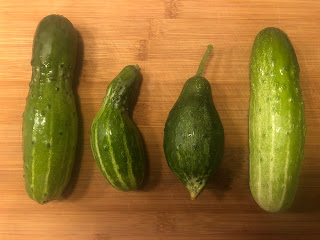Author: Natalie Hoidal, UMN Extension educator, local foods and vegetable crops
Some growers finally got some needed rain this week, with scattered pockets of showers leaving over an inch behind. Others got no rain at all, while a few growers got deluged by over 4" of rain in a single evening, and a few others experienced hail. Crops seem to be equally variable - I've been to a few farms where crops are growing quickly and things are looking great, and others where plants are really struggling with the drought and hot weather. We're continuing to see elevated insect pressure this week, and the forecast is showing minimal rain for most of the state (with the exception of West Central MN).
Crop updates
- Cole crops: Harvest continues for most spring cole crops, and planting is underway for fall crops. I received more photos of bolting broccoli this week than usual, despite temperatures being a bit lower than they have been in the weeks prior. Given the projects for continued high temperatures for the duration of the summer, make sure you're choosing heat tolerant varieties of cole crops for your fall successions, particularly for crops that form heads.
 |
| Bolting broccoli, Photo Natalie Hoidal |
- Potatoes: I received photos this week of splitting potatoes. Potatoes are particularly sensitive to inconsistent moisture, and so in dry years like this one it's not uncommon to see higher levels of splitting and hollow heart. While potatoes with these symptoms are still safe to eat, they are unattractive, and thus many growers struggle to market them. The second generation of Colorado Potato Beetles are out, and at this point in the season insecticides tend to become less effective (they are most effective on first and second instar larvae).
 | |
| Potatoes splitting as a result of inconsistent moisture. Photo: Katie Drewitz |
- Carrots and beets
are looking good. Growers are beginning to seed their first successions of fall carrots. Fall carrot timing is always a gamble, since they become sweeter after a frost, but if we happen to get a lot of rain in the fall, it can be hard to get into the field for harvest later in the season. The best bet for many growers is to simply plant at least a few successions. Aster leafhopper populations are rising across the state, and aster yellows have been confirmed (but not yet in carrots). Scout for leafhoppers as well as aster yellows symptoms regularly. There are many carrot varieties with tolerance to aster yellows, so consider planting more tolerant fall carrot varieties. With the heat and lack of rain, we can continue to expect high leafhopper populations.
Aster yellows resistant carrot varieties, Commercial Vegetable Production in Wisconsin 2021 manual.
- Tomatoes: Tomato fruit are forming in the field, and so far everyone's tomatoes look really great. We've had almost zero disease pressure this year, and the very very* hot weather passed just in time for healthy flower and fruit formation. We are seeing some standard disease pressure in tunnels, so keep scouting, but overall there seem to be no major problems.
- Garlic: We are in the final stretch, with 2-3 weeks until harvest. Keep irrigating your garlic, as you're now in the most critical period for healthy bulb formation. Aster yellows has been confirmed in a couple of locations at this point, but we do not yet have reason to suspect that we will see damage to the degree that we did in 2012. Scout your garlic this week for aster leafhoppers (see Marissa's article for a how-to guide), and look for plants that seem particularly yellow. Consider applying a pyrethroid insecticide now to reduce leafhopper populations.
- Cucurbits: I continue to get reports of totally out of control cucumber beetles. At this point in the season, pretty much all of the preventative measures we have (trap crops, mulches, traps, late planting) are off the table, and most cucurbits are flowering, which makes insecticide applications tricky. On top of this, I've seen some very misshapen cucumbers, which is typically a result of poor pollination. If you need to spray, do so in the evening to avoid pollinators.
 |
| Oddly shaped cucumbers are usually a result of poor pollination. Photo: Natalie Hoidal |
- Beans: I've received some reports of viral symptoms in beans from both east and central MN. If particular plants in your stand are looking mottled, consider removing those plants. Insect management is key for managing viruses, so scout for aphids. At this point, symptoms were not widespread, and so managing aphids with non-chemical methods is likely the best option for most growers.
Vegetable weather report
We have another very hot week ahead of us, with temperatures in the mid 90's projected over the weekend. Thankfully, nighttime temperatures should still drop into the 60s most nights. Nighttime temperatures tend to be more important than daytime temperatures for things like flower and fruit drop. There is some rain in the forecast on Monday and Tuesday, but the southwest and northern parts of the state are projected to receive almost no water. Growers in West Central MN are projected to get some reprieve with at least half an inch, and possibly even just over an inch of rainfall in the next 7 days.
 |
| 7 day precipitation forecast, weather.gov |
Problems in the field and things to anticipate this week
Invest in high tunnel ventilation now
Is your well struggling to keep up?
Educational opportunities
The Vegetable Beet: join us during your lunch break on Wednesdays for a
30 minute discussion about vegetables. Next week's topic will be about cucumber beetle management.
If you're seeing interesting things in
your fields, need help identifying problems, or just want to share
photos, we'd love to hear from you! Growers can reach out directly to me
any time at hoida016@umn.edu, and you can submit questions and requests for diagnostic help here.
Comments
Post a Comment